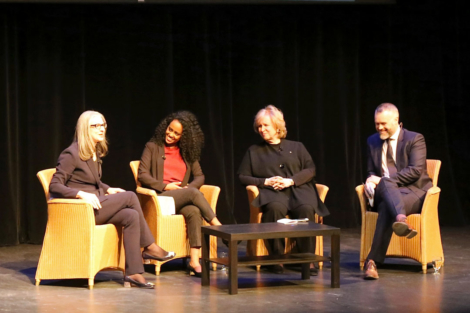Kim Campbell, Canada’s only female Prime Minister, spoke at U of T last week to discuss women in leadership and the barriers to entry that they face.
The event, on January 18 at the Isabel Bader Theatre, was held by the School of Public Policy and Governance (SPPG) and featured a talk given by Campbell, followed by a panel discussion with prominent women in the field of public policy, including Sarah Kaplan, Professor of Gender & the Economy at Rotman School of Management, and Terhas Ghebretecle, the Director of SPPG’s Gender, Diversity, and Public Policy Initiative.
Campbell focused on the problems she saw with how people perceive leaders, and how to fix these issues. She began by talking about whether things have changed since she was chosen for Canada’s top job after then-Prime Minister Brian Mulroney resigned in 1993.
“There is a growing understanding of why women leaders face the barriers they face,” she said. “Enough women have persisted that we’ve come to see what women in fact bring to the fields that they participate in.”

Campbell was joined by Sarah Kaplan and Terhas Ghebretecle. SHANNA HUNTER/THE VARSITY
Campbell served as Prime Minister for less than a year before her party, the Progressive Conservatives, were elected out of office.
“When I had political retirement thrust upon me by the Canadian electorate, it gave me time to go back to my social sciences roots,” she joked.
She continued to describe how research has shown that people perceive women to be “non-prototypical leaders.”
“When you are a non-prototypical leader, you are often seen as an anomaly,” said Campbell. “You fall off the radar screen when you’re out of office, even when you serve a full term.”
During the panel discussion, SPPG Director Peter Loewen asked how women should balance “trying to be tougher than men… and trying to change what the picture is of a political leader.” In response, Kaplan echoed Campbell’s statements, saying that people need to “change [their] own expectations of what [they] think a leader looks like.”
Ghebretecle said that “not all women have a choice.”
“When you’re Black, when you’re a woman, when you’re young… it’s about survival,” she said. “I don’t have that ability to be able to say, ‘Oh, should I try and advance the cause of women in this meeting and not have to care about whether I’m wearing makeup or not.’”
At the conclusion of the panel, Campbell said that one way to remove the barriers facing women is “to go back to see who were not seen in our history. The women, people of colour, Indigenous people, people who were left out of the narrative… It’s not new.”
Deb Matthews, former Ontario Minister of Advanced Education and Skills Development, was in attendance at the event. Speaking to The Varsity afterward, Matthews said “it was fantastic” and that she was eager to open the conversation up to “diversity of all kinds.”
“It’s not just women that we need — we need more young people, we need people to reflect the face of the province,” said Matthews. “I think it’s a really important conversation and I know we can do it because we’ve done it with women.”


